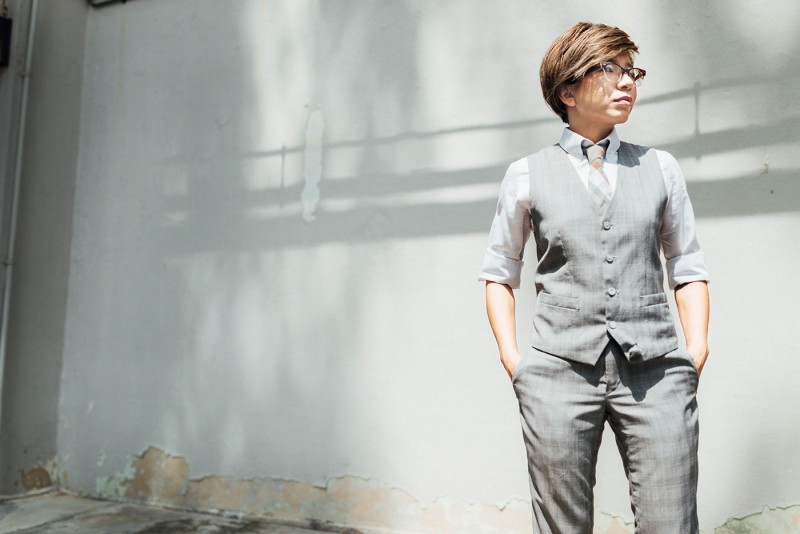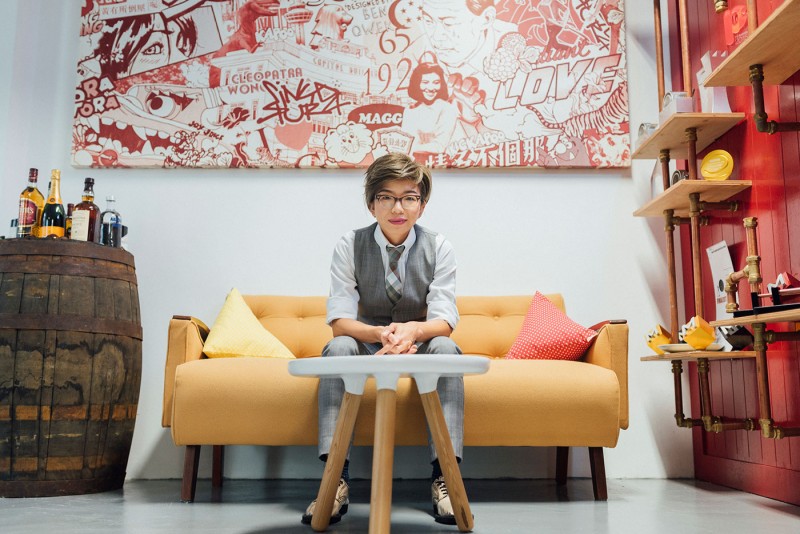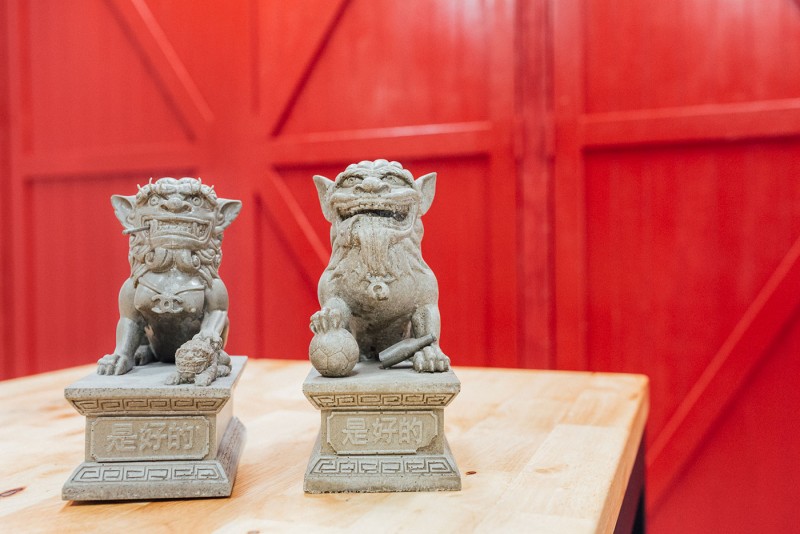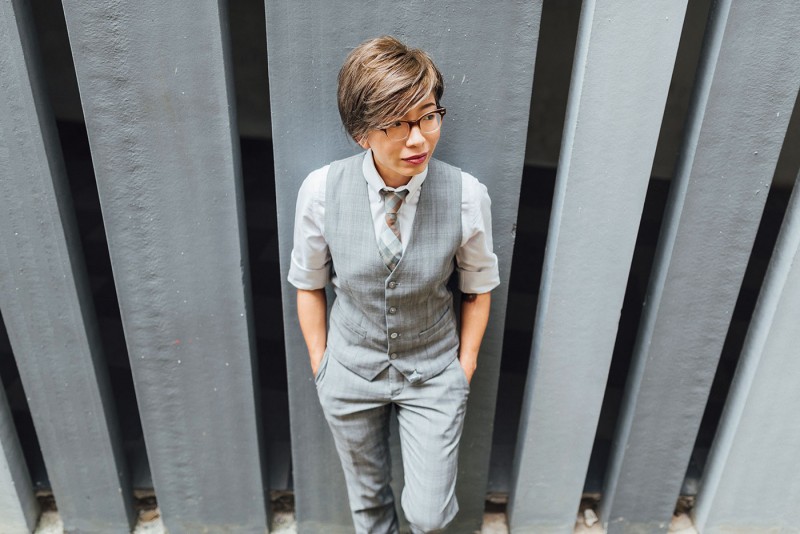Pat Law: An Unapologetic Badass
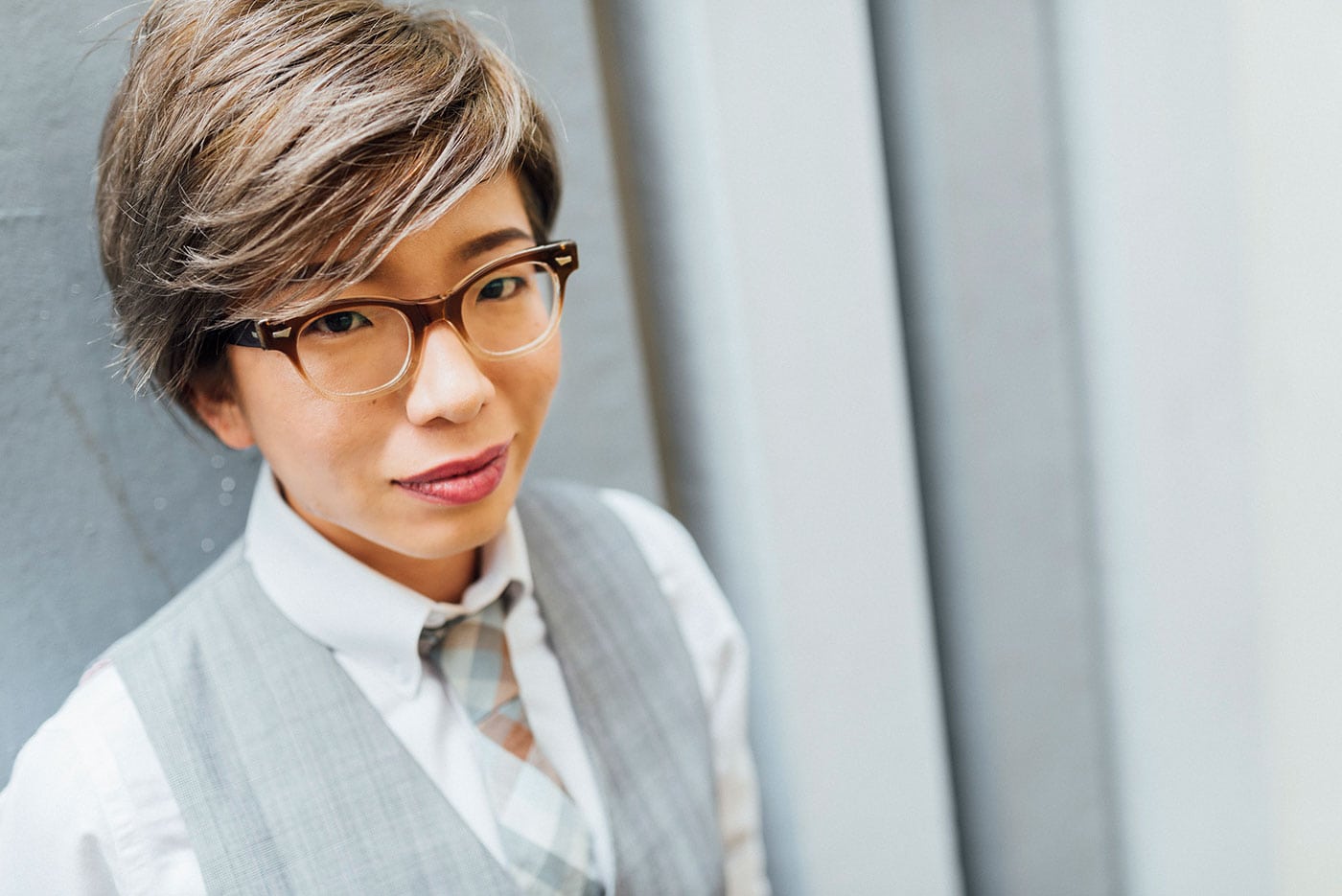
Pat Law is polarising—you either love her or hate her. Within seconds of meeting her on a cloudy, grey afternoon, I knew this was going to be one of those rare no-holds-barred interviews. Dressed to the nines, her sartorially well-tailored suit with no jacket, but a vest and plaid tie exudes masculine swagger that is so on point that she probably has her own co-ordinates. It is easy to be intimidated, and her incongruous touch of rose coloured lipstick does lend itself to the feminine puzzle. “I wear this outfit when I want to make a winning pitch.” Pat tells me, her voice revealing a slight lisp. Not before long, her unabashedly audacious and in-your-face personality unfolds. “I am incredibly vain actually. I have 300 pairs of shoes, and I struggled for 3 days before deciding to buy this pair of Comme des Garçons that I’m wearing at the moment.”
Apart from acknowledging her vanity (which not many are forthcoming about), Pat goes on to divulge her desire to show off. “I almost bought a BMW Z4 when I was going through a mid-life crisis last year. I am by nature a spendthrift, but I am also very self-aware of my weakness.” She takes a sip of her black coffee—something she cannot live without, before elaborating further. “I called my numbers guy and he tried to convince me to buy an artwork. But I can’t flaunt my artwork at Zouk, you know? I just wanna drive in and go ta-da.” I chuckle with amusement, and immediately see how mercurial, opinionated, and funny she is.
As the founder of GOODSTUPH, a social influence marketing agency, Pat’s creativity and ingenuity goes beyond the digital space. THE DAMN GOOD SHOP is another brainchild of hers to recreate childhood nostalgia of yesteryears with made-in-Singapore products that are delightfully iconic and local. She also sketches and does calligraphy on the side, but strictly for her own personal consumption. “Can I show you?” she asks, and whips out her phone. While getting a personal glimpse into her dark, yet emotive work, I respond instinctively with a question on how many tattoos she has. “I have 9 or 10. The tattoos on my left side are all related to my business. I have plans to get more, though I am more thoughtful these days.” She shrugs off her mistakes made in the past with ease. “I also have your typical dragon with clouds on my lower back, which I regretted. . . but it’s part and parcel of life.”
Anyone who is in the marketing scene knows who Pat Law is. Having countless of awards under her name not only reflects her aptitude, but is also a testament to her unwavering fortitude. Her very first elevator pitch was to Irene Ang. And waiting for 4 hours at a bar, with no money, but a glass of water in hand never once stopped her from achieving her goal.
WY-LENE YAP: Happy Belated Birthday! What did you wish for?
PAT LAW: Happiness. This year hasn’t been the best year for me. I am not depressed or sad, but I had to deal with a lot of things. I started GOODSTUPH because my dad had brain tumour. He still has it actually – thankfully, benign. This year, they found 2 brain aneurysms, so he had to go for surgery. Coincidentally, 2 hours before my dad’s surgery, my mum fell and broke her arm. My god, of all days to break her arm! I was in and out of the hospital many times… so that was a bit tough because it became very real to me that my parents have expiry dates. They refuse to stop working and I really admire them. A week after my dad’s surgery, he went straight back to his hawker stall to fry his oyster omelette because his worker went MIA on him. I wish that my parents would just allow me to take care of them. I think you need to experience sadness in order to be happy, and it’s powerful when you can be happy regardless of everything that you’re going through. Society makes us a certain way right? If I can’t pay the bills, I would be unhappy automatically. You will always find something to be unhappy about – and that’s scary. I want to be contented.
WY-LENE: You can always switch your perspective. The term is called “transcendence”, which refers to the idea of going beyond the present state into a higher one. Were you born creative?
PAT: I was born premature by a month, and my growth was affected. I could not talk for the first 4 years of my life, but I could draw, and the funny thing was my mum thought that I was a child prodigy. My parents brought me to speech therapy, and they also ran some tests because they thought I couldn’t hear. Actually, I was just that slow to react. [laughs] Since I could draw at the age of 4, my mum immediately sent me for fine arts lessons. In a way, I was exposed to the world of creativity, and I kept drawing even after my O levels. Later on, I studied marketing and discovered that although my first love is art, I love making money. So how can I use creativity to make money? Will I be happy being a banker who earns $20k a month? No, absolutely not.
WY-LENE: Which do you love more: being creative or making money?
PAT: I like them both. For example, I can draw a stick man because it makes me happy. But there is a higher purpose when you use creativity to address a problem in society, and I prefer doing that, and at the same time, get paid for it. I do make exceptions for my homies. When GOODSTUPH first started out, we had a lot of help. I am lucky that I make money running a social influence marketing agency. Although I do calligraphy on the side, I have given them away because I wouldn’t buy my own art. I don’t think I’m good enough… so that passion remains a hobby. I sound like a wet blanket because quite a number of people celebrate passion, but they do not know their limit. If you’re not good enough, and you make people pay for artwork, you’re insulting them. I may not draw as well as I like to, so I engage illustrators and work with them for certain campaigns. I am happy not being the hero of the day.
Prior to the Internet, creativity used to be formed by assembly of information. . . But in today’s world, because of how we are overloaded with information, creativity is sometimes formed by deconstruction.
WY-LENE: Where do your ideas come from?
PAT: Everywhere. I don’t like thinking when I’m showering. When an idea hits me, I make sure that I write it down. It can be very random or structured at times. If a client gives a brief which spells out the objectives and problems, I will set perimeters around it. Prior to the Internet, creativity used to be formed by assembly of information. For example, if I wanted to write a final year thesis paper on a particular subject, I would have to go to the library to look for research that supports my hypothesis. But in today’s world, because of how we are overloaded with information, creativity is sometimes formed by deconstruction. You wouldn’t even know if you’re copying someone’s work. That is why I am more careful about keeping certain noise away... you need to filter through the noise to find the core of the idea.
WY-LENE: Many people confuse opinion with fact.
PAT: Yes, I agree. And it can ruin the purity of creativity. When I need to churn out ideas, I will block out 2 to 4 hours. I can’t do it during a working day, as I’m constantly distracted. For topics that I am very familiar with like the beer industry, or even the beauty industry, I don’t need to do any research. However, there was one time I did work for an insurance client, and I needed to understand the product before I could think of ideas. So I called my own insurance agent and spoke to her for 4 hours.
WY-LENE: What inspires you the most in life?
PAT: Survivors – people and their stories. Everyone has their own stories; we write and define them. Sadly, some people’s stories are bland and a copy of others. But no matter what, before you start your story, you draw inspiration from somebody else’s story – you kind of learn that way – be it good or bad. Sometimes as a Singaporean, I can suffer from a ‘chihuahua’ syndrome. I don’t have any concept of my own size. So by travelling and meeting new people, I learn a lot from them and that helps to keep things real for me.
WY-LENE: What’s the most inspirational story you know?
PAT: I can’t name one per se. Every time I feel the temptation to whine about life, my parents will put me in my place – without even doing anything. They have been working since I was born, and it has been a tough life. My folks had a duck rice stall at Changi Airport, and the Airport used to be my playground. They would work from 5am in the morning to 8pm every day. After coming home from work, my mum would give me English tuition. God knows how she did it… and she’s not educated… no wonder I failed. Subsequently, my mum felt that I needed more exposure, so I went to London to live with my aunt. And every 3 months of the year, I would go to London.
WY-LENE: What age was that?
PAT: From the age of 9 till secondary school. After that, teenage angst took over and I didn’t want to go to London anymore.
WY-LENE: Your parents are the real Singaporean heroes.
PAT: I am proud that my dad is a hawker, and because I had to help him when I was younger, I have seen the uglier side of human beings. And I told myself there was no way I am going to be that kind of person who looks down on others. You can have first-class consumer goods and third-class manners.
WY-LENE: Yeah, manners can’t be bought. What are you working on at the moment?
PAT: It’s a quieter time for us now. I am lucky that my team can run on their own, and work on different projects at the same time. I oversee everything and I’m more involved in new business developments. Last month was really crazy; we went around pitching aggressively so we are waiting for the results. We just won one recently, and Keppel Land is now our client. Winning to me, is when I see the signature on the dotted line. Although new businesses are important, my focus is on extending my retainer contracts – UOB just re-signed with us for another year. I do plan and work in advance whereby I know exactly how many months I can last without any new business.
You attract what you are.
WY-LENE: How many clients do you have?
PAT: Around 30. We have 10 retainer clients. We also do local and regional campaigns. Right now, 50 percent of our business is not in Singapore. I respect the competition here, but if I want to make a name for ourselves and do our country proud, we need to have a global perspective. We do learn everything the hard way and realise how ignorant we are. For example, we were in Thailand to roll out something, and we didn’t understand the Thai temperament. We are so different from them – to us, ‘A’ is ‘A’, ‘B’ is ‘B’, and here is your money. For them, it is whether they like your face or not. So how are you going to win them over with your face? That’s an art, not a science. There was another event in KL, and we stated smart casual as the dress code. In Singapore, people will normally wear a shirt and a pair of pants. But over there, they showed up in Bermudas. [laughs]
WY-LENE: How long does it take to convince someone of your idea?
PAT: Our brand name has helped to attract a certain personality type. I seriously cannot imagine a slimming centre approaching us to do a before and after celebrity ad. I guess we do have an automatic filter – you attract what you are. So once we get a client, the brief will be: do what you do best. And this cuts across all types of industries – it’s not just Nike or Ben & Jerry’s, but also very corporate clients who place their trust in us. Normally, when we put our ideas forward, 90 percent of the time, our ideas are accepted in the first round. Sometimes, it does go into the second round because we go off tangent, but that seldom happens. If it needs to go into the third round, then it’s my responsibility to decide if we are right for the client. The first meeting is the most important – you can tell immediately if you understand the client and vice versa. If there is no chemistry, then you should not go on further.
There are times when I know the objective cannot be achieved with a social media solution, and I could take the client’s money and bullshit a post-campaign report to say that I did a good job, but I don’t.
WY-LENE: How do you deal with clients who have a traditional marketing perspective?
PAT: Clients come to us when they want to do something social. We do have traditional clients, but it’s about breaking down the barriers and understanding what is the big picture, objectives and how to address the problem. There are times when I know the objective cannot be achieved with a social media solution, and I could take the client’s money and bullshit a post-campaign report to say that I did a good job, but I don’t. In fact, I tell the client to channel their money elsewhere. We are quite known for that actually. Honesty goes both ways – some people might think I’m arrogant because I declined their offer… but if I know I’m going to fail, I am not going to make any promises. Sometimes, we even tell clients that they need to do more traditional marketing. You can’t sell a Rolls-Royce on Facebook. For every $100,000 you spend on media buy, you may get 1 million people viewing your banner on your microsite. But how many people will buy it? And what’s the real conversion rate?
WY-LENE: How do you measure social media influence? By reach and engagement?
PAT: There isn’t a master template – every single client has different objectives. If the objective was to create brand awareness, then naturally you would look at the reach. If the objective was to create brand affinity, then you would look at the people who are sharing it. Your engagement can be really high, but if it was paid, then how much of it is organic?
WY-LENE: I know your company prides itself on doing things differently. How do you know when to push the boundaries and when not to – at a risk of being too controversial?
PAT: We consult our lawyer to make sure that we do not get into trouble. We are mindful not to offend anyone, or be rude and disrespectful to any race or religion. For example, the GOODSTUPH Stone Lions are not related to any religion. If a Chinese gets offended by them, then I will meet you for lunch and apologise to you personally. Otherwise, I don’t care.
It is very easy to say no. But I dare you to say no, and offer a solution.
WY-LENE: As an agency, you have always managed to preserve your authenticity. Were there times when this conviction was severely tested?
PAT: No, not really. We do not have clients who just want it their way. Of course, there are times when we disagree, but I think our strength lies in our ability to work together with them. Here’s the thing: it is very easy to say no. But I dare you to say no, and offer a solution. My team is not allowed to say no without an alternative.
WY-LENE: What is your long-term goal for GOODSTUPH?
PAT: I want the kid from Brooklyn to say, “I wanna work for GOODSTUPH.”
WY-LENE: Which part of Brooklyn? Williamsburg? Bushwick?
PAT: Doesn’t matter. [laughs] I want us to become the agency that people want to work for. And just because I’m local, does not mean I have to be cheap. I will never give a lower quote just to win a new business – that’s the wrong way.
WY-LENE: You should not devalue yourself.
PAT: Exactly, and I believe in value adding. Can the client call me at 3am in the morning? Yes, but you’re going to hear a very groggy person. Previously, I presented our ideas to a potential client (who never became our client,) and she said, “I love the ideas. Now that I have them, tell me how you are going to value add because I can run it on my own.” I actually told her we have different values and I can’t work with a person like you. She called me rude and arrogant, but I took her comments in stride. I don’t expect you to pay for me to pitch; however, if you’re going to accept my ideas, you cannot question what I’m going to do. If you want the local industry to grow as a whole, there are certain things that you have to put your foot down.
WY-LENE: You need to remain authentic to who you are, and not bend over backwards.
PAT: Yeah, because what do you stand for?
WY-LENE: Currently, do you have any investors?
PAT: No – zero investors. When I first started out, I took a $10,000 loan from Irene Ang, and I paid her back in 3 months.
WY-LENE: Are you looking for investors down the line to grow your business?
PAT: We have received a few proposals, but the diamond is not big enough.
If you are insecure and do not have a thick skin, then you are not going to survive in my company.
WY-LENE: Tell me more about your management style.
PAT: I’m like Gordon Ramsay. I am very in-your-face if I disagree with something. Internally, I will shoot down 9 out of 10 ideas from my staff. If you are insecure and do not have a thick skin, then you are not going to survive in my company. I like to question every idea incessantly because I am trying to fill in the loopholes. Subsequently, if the idea goes through, I will give credit to the person and boldly tell the client that it’s not mine. I never take credit for someone else’s work – in fact, I will help the person polish his or her idea. I have seen people with 101 loopholes at the beginning, but now their foundation is so strong that they are spotting my mistakes. I am also very particular about making silly mistakes like misspelling the client’s name or an extra spacing between two words. It might be very small and insignificant, but I will scream. You need to be diligent in your work. Such mistakes should be avoided.
WY-LENE: How big is your team?
PAT: I have 12 people.
WY-LENE: How do you make a decision on complex issues?
PAT: I will think it through, and smoke 3 to 4 cigarettes first. Sometimes, I am driven by my gut feeling. When I feel like I may be making the wrong decision or unable to see things from a different perspective because of my lack of experience, I will call certain people and ask for advice.
Hunger makes you do things you never thought you would do.
WY-LENE: What is the most important trait you look for when hiring?
PAT: Hunger makes you do things you never thought you would do – and that can’t be taught. I think passion is seriously overrated.
WY-LENE: By the way, are you represented by FLY Entertainment?
PAT: I am! It’s a funny story. I knew Irene [Ang] before I turned 21. When I was 20, I worked for Nestle, and they had a pet food division. I needed a celebrity to talk about Fancy Feast and Irene had a cat. However, I didn’t have money to pay for endorsements. So I found out that she has a bar at Club Street and I waited 4 hours for her. It’s a bit stalkerish now that I think about it. Anyway, as soon as Irene appeared, I said: Hi, you don’t know me, but I would like to sponsor your pussy. She got a shock, and her manager wanted to get rid of me. I still did my elevator pitch and she entertained me. Irene really has a heart of gold. Eventually, I scored a 12-month sponsorship – she got free cat food and in return, if any media were to ask about her pets, she would mention Fancy Feast. That was my first pitch ever. I remembered not having any money to buy a drink, and the bartender was damn annoyed because I was shamelessly waiting with a glass of water.
WY-LENE: Wow…
PAT: I can imagine the average person thinking: So paiseh lah, why am I here for 4 hours? I can’t afford to buy a drink so maybe I should leave. I could have done that but I wanted to close the deal. That was how we met, and before I knew it, I was part of FLY Entertainment.
WY-LENE: I read that you have a lot of wonderful mentors. What makes a good mentor? And how do you find the right one?
PAT: It needs to happen organically. Sometimes you get the chance to work with them. Linda Locke is amazing, and she used to be known as the “dragon lady” in the ad industry. One day, a headhunter called and said, “Would you like to work for Linda Locke? And I said yes immediately. Nowadays, whenever we meet up for lunch, she always has a lot of questions. She is such a quick thinker and is incredibly intelligent. By the end of the meal, I would lose my appetite; yet gain a tremendous amount of knowledge from her.
WY-LENE: As a proud member of the LGBT community, why do you think sexuality is such a touchy subject?
PAT: Singapore is still not that open as a society, but we have grown a lot. I would like to reach a stage where people would not point at someone and go, “Eh, that one gay.” I think we still do it in a subtle way. For many people, sexuality is related to race and religion. I am lucky that my parents are okay with my sexuality, although we don’t talk about it. They will ask my girlfriend to read letters for them… during Christmas parties and weddings, my girlfriend will be invited too.
WY-LENE: How long have you been with your girlfriend?
PAT: Just over a year.
WY-LENE: Would you like to have kids?
PAT: Yes, one boy and one girl.
WY-LENE: Are you planning to adopt?
PAT: The last time I got so caught up in the process of adoption that I googled: where to buy a kid. [laughs]
WY-LENE: [laughs] Do you believe in labels?
PAT: No, love is fluid to me. A lot of people like classifying people into different categories, and that’s fine by me. I have been called many funny names before and when I tell people I have dated more guys than girls, their response is priceless. Well, I tried… until I realised that I’m gay.
WY-LENE: What is your secret vice?
PAT: I love a good gamble. I don’t like playing safe – the harder it is, the more I want to do it.
WY-LENE: Last question: What are you most grateful for in life?
PAT: Human kindness – people who have helped me when they didn’t have to.
